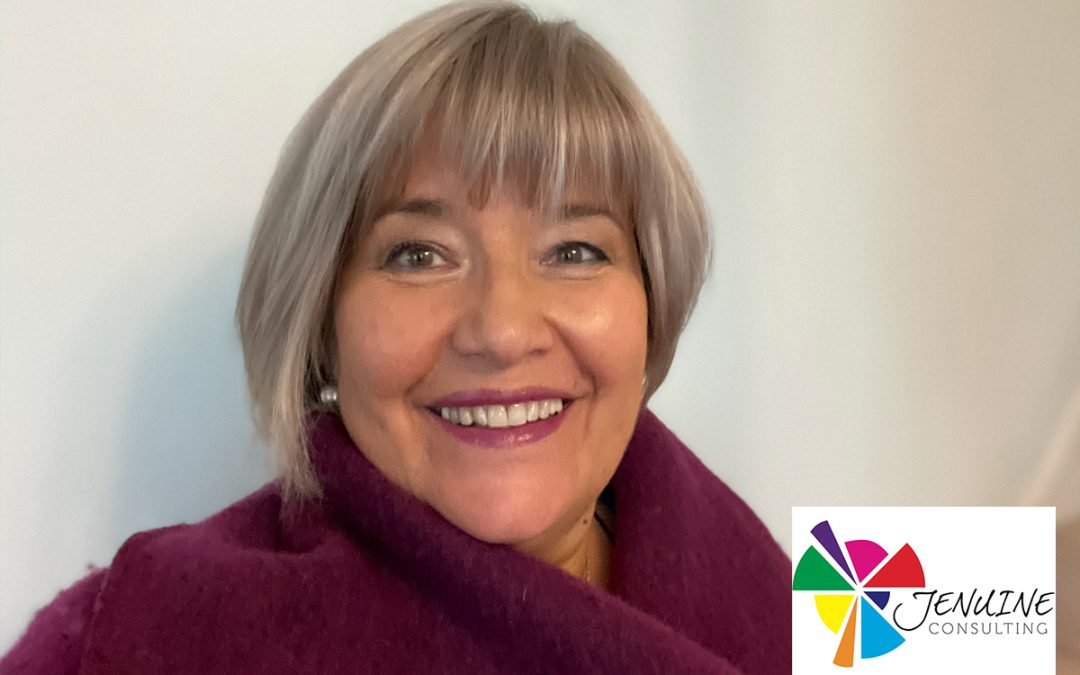In the month we celebrate St Valentine’s Day, Jenny Gordon from Jenuine Consulting outlines how we can all show love in our business relationships, when we understand how trust plays a vital role. Read on to find Jenny’s interesting way to calculate your Trust Score.
February is the month of love; at least that is what the commercial world likes to promote. I don’t subscribe to that at all so in order to make sure that I remain authentic, and Jenuine, I will start with clarifying some assumptions.
First, love is for all months of the year, every year. It is one of the core emotions that makes us human, and I believe one of the most powerful when it is used in its purest form.
Second, there are lots of different aspects of love: love of nature, the world, your children, your partner, your friends, the love you have for your business, your job, your hobbies – food, art, travel.
Third, there are different types to consider – an unconditional love that is infinite without limitations, given freely without expectation of return, and conditional love that may endure but that has been earned and may be based on some kind of exchange.
At the heart of all love and relationships is trust. Trust a small word for a very big thing!
The dictionary definition of trust is ‘a firm belief or confidence in the reliability, truth or ability of someone or something’.
The word belief can be problematic can’t it, because our beliefs are often based on our previous experience or the experience of others. So belief can be a movable feast. I’m going to explore trust in this blog, I’m going to break it down into its component parts and share with you an equation that I use to measure trust.
As with many things in life, it’s not an exact science but it is a really simple way of understanding why trust can be so tricky; it does give a quick way of evaluating your level of trust and helps to consider ways to build and sustain it once you have it!
Confidence: how sure are we of the ‘truth’ that we see or hear? How do you determine confidence? Do you listen to your gut feelings? Do you actively seek evidence and if so, what are the data you look for?
Reliability refers to the frequency that we behave in a particular way. Perhaps we regularly intend and say we will arrive on time, but evidence shows that we are often late – reliably late! In this example, there is a difference between what is said, the intention and the outcome, how others experience us.
All this has an impact on the way in which we develop trust… Here’s my equation:
T= C (10) x I (10)
_______________________
R 100
C stands for competence and credibility. Competence is your depth of knowledge and skill; how good you are at what you say you are going to do. Credibility is your ability to take what you know and make it applicable and relevant to the situation you are in. We give this a score out of 10. 10 being highly skilled at both, 1 being a novice.
I stands for intimacy which is made up of your ability to make Emotional connections and the strength of your ability/desire to form and sustain Relationships. Give yourself an intimacy score out of 10.
R is Risk. Risk is always 100 which will give us our percentage score. You multiply the C score by the I score, for example you may be new into your role, you know you are competent and credible but have not really had the opportunity to demonstrate it yet, so you give yourself a 6. You are at the start of building relationships with your colleagues, I have strong evidence that cake speeds up the emotional connection! You may give yourself an Intimacy score of 5. 6X5=30. 30/100 so at this point your Trust score is 30%. Not an unreasonable score for someone new in role.
But this is where it gets really interesting, different personalities give different emphasis to the components. Some focus primarily on the competence/credibility, giving little attention to developing intimacy. For others, relationship and connections are key, their focus on competence is less important.
If you play with the scores you will quicky see that a high score in one OR the other does not give you a high total Trust Score – we need to build and maintain both sides, to balance the equation as my old Maths Teacher used to say!
Which brings us back neatly to you dear reader… how well do you know yourself? In this busy world of ours we often don’t take the time to be curious about ourselves – explore the many facets of what makes us uniquely individual. How do you trust yourself if you don’t understand yourself?
There is no one way to build and maintain Trust, but as it is fundamental to all our relationships, business and personal. My invitation to you is to spend some time considering how you see and feel about the components of trust; develop an understanding of you. Once you understand yourself, you can begin to understand others. Love of course is for life not just for February!
If you or your business need some support with this, let’s have a conversation.
Jenny, the Brilliance Coach at Jenuine Consulting Ltd.
For all your people development needs, business and personal. Whether its personality profiling, leadership, team effectiveness, managing meetings, we have bespoke and off the shelf solutions to help you grow your business and make sure that your people are your most brilliant asset! https://www.jenuineconsulting.com
Tel: 07817872635 if you want to explore more.
For personal development join my signature 6-week group programme, FACETnating YOU to rediscover and reclaim your unique brilliance. Next Programme starts soon. Places limited so book early to get yours. https://jenuineconsulting.com/product/facetnatingyou-programmme/

